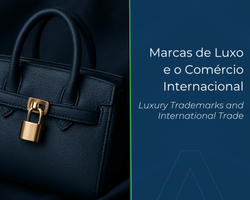araripe@araripe.com.br | +55 (24) 2103-2200
ARARIPE is a law firm with an excellent reputation in defending Intellectual Property rights, both judicially and administratively. We offer a differential advantage to our clients which allows them to stand out in their market segment.

Our business aim is to provide legal advice in both administrative and judicial contexts. We are focused on achieving the best results for clients’ demands, meeting them efficiently and competitively.
Access the main articles and news written by ARARIPE’s lawyers and engineers, based on the demands and interests of our clients.

In recent months, viral videos on social media have revealed what many had already suspected: a significant portion of luxury brand products are manufactured through outsourcing, often in countries with more favorable labor laws and lower production costs.
These products, now caught in broader geopolitical power struggles involving international tariffs in a sensitive scenario, have had their production details disclosed by local manufacturers. They have questioned the added value attributed to luxury brands, exposed local production lines, and raised concerns about the benefits of indirect versus direct purchasing, which generates legal and commercial implications.
Although regulations involving luxury goods may allow products to be labeled as manufactured in a specific country based on a minimum percentage of local production, the sale of luxury items does not necessarily serve only a commercial or profit-driven purpose.
When purchasing luxury goods, we are not just acquiring quality materials or craftsmanship. It’s not just Hermès leather, for instance, that gives their products such high market value. By purchasing these items, we are embracing a certain status, showcasing particular quality or financial achievement, or simply gaining access to a product that, initially, has an enormous waiting list.
However, what seems to have sparked buzz on social media is not only the outsourcing of luxury goods production—which is expected by more informed consumers—but the disconnection between reality and the image brands have promoted: one of artisanal, unique, and meticulous craftsmanship, as opposed to the mass production typical of fast fashion items like those from Zara.
Despite the gap between consumer expectations set by luxury brands and the reality of part of their production, the truth is that luxury brands distinguish themselves not only by the quality of the materials used and the specialization of labor (even if at lower cost due to outsourcing), but also through stringent quality control, specialized services, superior finishes, and the symbolic and intangible value attached to the brand, along with everything that associates with it, such as the personalized shopping experience.
In fact, many luxury fashion items, such as watches, handbags, shoes, and eyewear, are viewed as true financial investments. Depending on their condition and whether they are actually resold, they can outperform the return on investment (ROI) of even the most efficient and renowned financial funds.
In addition to the aforementioned attributes, verified provenance through invoices and official certificates is essential for valuing items in the case of future resale. This is where direct purchases, even if sourced from the same outsourced manufacturer, reveal their vulnerability. In addition to undermining a structured and specialized production chain, such acquisitions may constitute violations of intellectual property rights—including trademarks, industrial designs, trade dress, and trade secrets—and breach exclusivity and distribution agreements established between brands and their partners. Therefore, this is not just a commercial issue but one with significant legal consequences.
For companies that manufacture or outsource production outside their home countries, understanding the local market is as important as registering their assets. The lack of an adequate protection strategy can create an opportunity for third parties—including former partners—to preemptively register trademarks, industrial designs, or packaging as their own.
This highlights the importance of structured international protection of intellectual property assets from the outset of operations. Specialized legal counsel—especially during the internationalization process—is crucial for identifying risks, building a defensive strategy, and ensuring the legal security necessary for the company’s international expansion to be solid, enduring, and aligned with the global reputation the brand seeks to maintain.
Font: Araripe

▪️ Luxury Under Scrutiny: The Brazilian luxury brand Tânia Bulhões Dishes Buzz and the Importance of Intellectual Property. Recently, the luxury Brazilian brand Tânia Bulhões found itself at the center of a controversy involving authenticity and intellectual property rights. It all started when a consumer found, in a store in Thailand, a cup extremely similar to those sold by the trademark, but without the official logo. The episode quickly sparked questions: is it a fake? A deviation in the production chain?
▪️ What really happened? The company has issued a statement clarifying that the product was marketed without its authorization, through an unauthorized supplier and outside its quality control. In response, it announced measures to strengthen its vigilance over the production chain, ensuring that only original products reach the market.
▪️ What Does This Case Teach Us about Intellectual Property? This incident highlights a real risk faced by high-value trademarks: the circulation of unauthorized products, which can compromise their reputation, confuse consumers and generate financial losses. And this is not an isolated case: companies in all industries need to adopt effective strategies to protect their intangible assets, combat counterfeiting and avoid litigation related to copies and infringements of copyright and trademark rights.
▪️ ARARIPE specializes in the protection and defense of Intellectual Property, helping companies to ensure that their trademarks, designs and creations are shielded from misuse.

Carnival is not just about partying – it is also a major driver of the Brazilian economy! In 2024, the National Confederation of Commerce (CNC) estimated that the festival generated an impressive R$ 12 billion (over 2 billion dollars), a 2.1% increase over the previous year.
With this economic boom, new businesses, trademarks and products spring up every year to meet the demand of the world’s biggest street party. Street parades, abadás (Carnival t-shirt), drinks, events, accessories and various other products and services become the protagonists of this season, requiring special attention to trademark and copyright protection.
In addition to registering a trademark, which gives you the right to use it exclusively throughout the country, there are several precautions that should be taken during Carnival times, such as monitoring third-party use, making licensees aware of how the trademark should be used, as well as being careful when promoting marketing strategies that could infringe on third-party rights.
Carnival may be over quickly, but its legal and commercial implications remain. Ensuring your brand and assets are protected is essential for the security and continuity of your business.
Source: https://portaldocomercio.org.br/publicacoes_posts/pesquisa-carnaval-2025/
Avenida Ipiranga, 668
25610-150 Centro
Petrópolis RJ Brasil
Tel. +55 (24) 2103-2200
Fax +55 (24) 2103-2201
Rua da Assembléia, 10 Gr. 3710
20011-901 Centro
Rio de Janeiro RJ Brasil
Tel. +55 (21) 3923-5158
Alameda Santos, 200 CJ.71
01418-000 Cerqueira César
São Paulo SP Brasil
Tel. +55 (11) 3263-0087
Todos os direitos reservados @ Araripe
CNPJ: 00.000.0000/00
| Cookie | Duration | Description |
|---|---|---|
| cookielawinfo-checkbox-analytics | 11 months | Este cookie é definido pelo plug-in GDPR Cookie Consent. O cookie é usado para armazenar o consentimento do usuário para os cookies na categoria "Analytics". |
| cookielawinfo-checkbox-functional | 11 months | O cookie é definido pelo consentimento do cookie GDPR para registrar o consentimento do usuário para os cookies na categoria "Funcional". |
| cookielawinfo-checkbox-necessary | 11 months | Este cookie é definido pelo plug-in GDPR Cookie Consent. Os cookies são usados para armazenar o consentimento do usuário para os cookies na categoria "Necessário". |
| cookielawinfo-checkbox-others | 11 months | Este cookie é definido pelo plug-in GDPR Cookie Consent. O cookie é usado para armazenar o consentimento do usuário para os cookies na categoria "Outros. |
| cookielawinfo-checkbox-performance | 11 months | Este cookie é definido pelo plug-in GDPR Cookie Consent. O cookie é usado para armazenar o consentimento do usuário para os cookies na categoria "Desempenho". |
| viewed_cookie_policy | 11 months | O cookie é definido pelo plug-in GDPR Cookie Consent e é usado para armazenar se o usuário consentiu ou não com o uso de cookies. Ele não armazena nenhum dado pessoal.
|